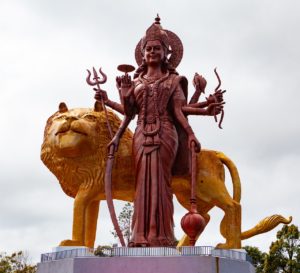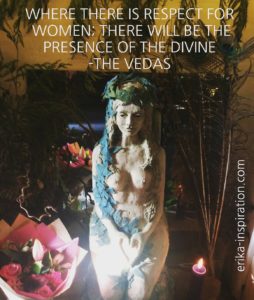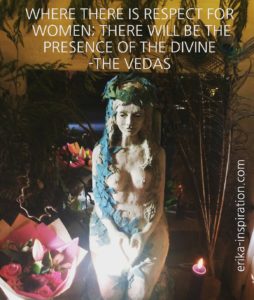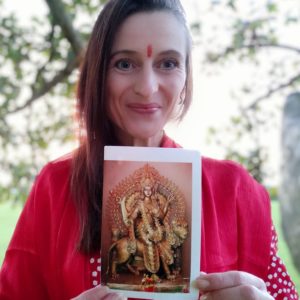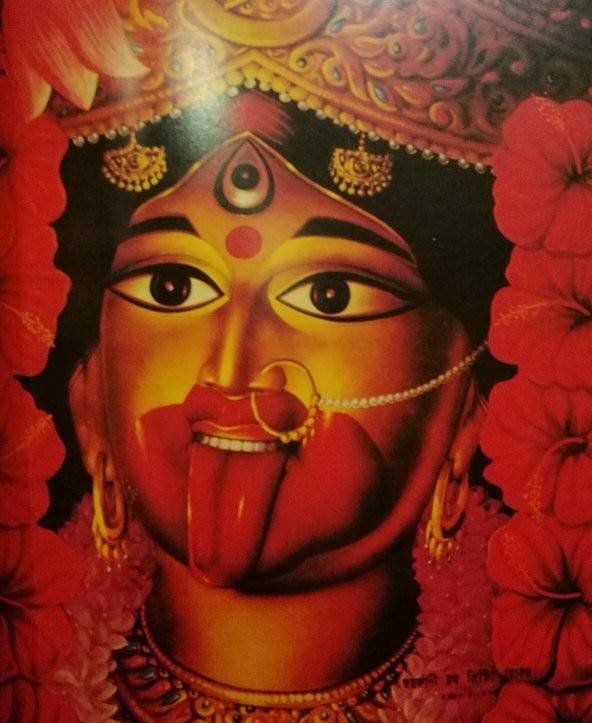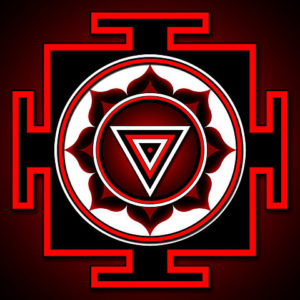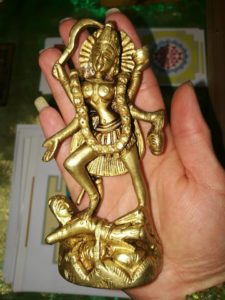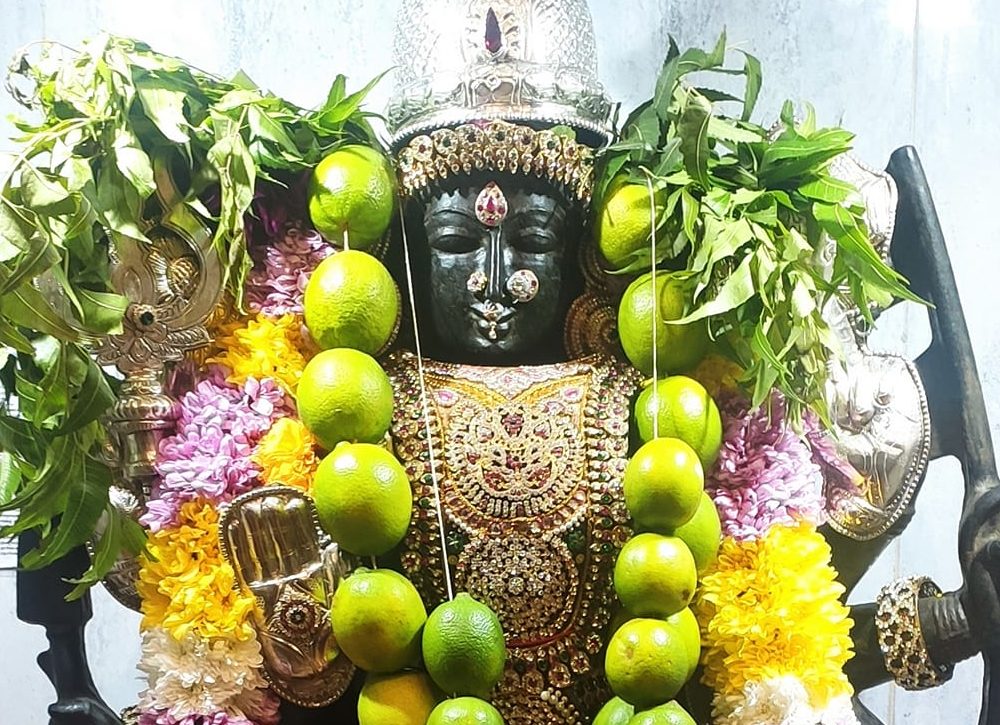
Navratri – a nine day festival dedicated to the Divine Mother
Navratri or Navaratri is a nine-night celebration of the Divine Mother. It begins – on the first new moon in early autumn and culminates on the tenth day with the celebration of Dussehra. Nav’ means ‘nine’ and ‘ratri’ means ‘night’. Thus, ‘Navratri’ means ‘nine nights’.
It is a major festival in the western states of India: Gujarat, Maharashtra, and Karnataka. It is also celebrated in North India, including Bihar, West Bengal, Madhya Pradesh and the northern state of Punjab. It is believed that celebrating Navratri can help to overcome obstacles, eliminate negative qualities and replace them with pure divine qualities.
During Navratri, people often gather to perform ‘pujas’ on small shrines representing different aspects of Goddess Durga, including Goddess Lakshmi and Goddess Saraswati. Navaratri is celebrated differently in different parts of the world. In some parts of the world, the first 3 days are spent worshipping Goddess Durga to introspect and defeat negative qualities and impurities within. The 4th, 5th and 6th-day honour Goddess Lakshmi who bestows spiritual wealth and abundance. And the 7th, 8th and the 9th day are devoted to worship Goddess Saraswati, Goddess of wisdom and knowledge to achieve success in life with humility and grace.
The Goddesses embody transformative power (Shakti) and can awaken you or shake you up in countless ways. Shakti means power or life force. One way to understand Shakti is to see it as vibration behind all that is. There are various practices which can help you to connect with the Goddesses.
One way is to set up a shrine or to visit a temple and to make offerings. Another approach is using various mantras or visualisation.
The third way is to internalise the goddesses which means identifying yourself more and more with the qualities of the Goddesses and to understand that ultimately all the qualities are within you. The understanding and wisdom will arise gradually from within when you connect with them consciously and with pure intentions.
Durga is the form of the mother goddess in Shaktism. She is a multi-dimensional Goddess, with many names, many personas, and many facets. She is mostly known as the warrior goddess of protection and inner strength.
In Sanskrit, the word ”Durga” literally translates as the one who is ”unbeatable” or “invincible” and cannot be defeated, hence ”unconquerable”.
The Goddess is a sacred symbol of female power and reflects the strength, the very pure essence of the divine feminine. She is the cosmic warrior, the force within consciousness that battles ignorance and darkness, but her face is compassionate and peaceful. You can see her as an aspect of your higher Self to realize your own divinity and also to recognize this world as an expression of the Divine.
You can draw on the transformative power of Durga you if have a need for extra protection or if you have to set stronger boundaries by chanting the following mantra:
Aum dum durgaye namaha which means I bow to Durga or I bow to the Divine feminine energy which protects from all aspects of negative influences.
A shadow Durga can manifest in an extremely controlling, dominant, critical, self-righteous boss or overprotective and disempowering mother.
The second set of three days of Navratri are Lakshmi related – a very gentle, nourishing, graceful, generous and beautiful Goddess. She is the protector and the bestower.
She is generally depicted in the images and statues as seated on an open eight-petaled lotus flower holding lotus flowers in her two hands and holding the other two in abhaya (assurance) and varada (giving) mudras (gestures) respectively.
The lotus represents a purity of consciousness and the ability to stay above the mud, to shine brightly from within, to blossom and not to get carried away by outside circumstances.
In the physical world, Lakshmi represents success, material wealth, fortune and beauty.
However, her mesmerising beauty and unconditional sweetness can also keep you in the world of illusion. If you chase only material wealth and beauty for example or are fooled by superficial appearances you will remain in the world of Maya.
The real wealth and beauty are our inner qualities. Those who understand this do focus on cultivating noble virtues such as kindness, compassion, love, purity of mind and heart first before asking for material abundance. Otherwise, the material wealth may create more imbalances.
Adi Shankaracharya describes that sat sampati, or six forms of wealth (calmness of mind, self-control, self-
withdrawal, forbearance, faith and single-pointedness) need to be cultivated to attain wisdom. These virtues
are important because when we have mastery over our mind we do not get completely out of balance when challenges arise or changes take place in our lives.
Someone who has mastered the energy of Lakshmi trusts in the universal flow of abundance even at times when there is seemingly not enough. Deep within they know that a change is on the horizon during leaner times. They value themselves and do not hesitate to ask confidently for a fair energy exchange or compensation for any services provided. Simultaneously they are aware of the subtle source of material wealth and embody the energies of gratitude and appreciation.
A shadow Lakshmi manifests in greed, constant worry about money, strong attachment to material goods, lack of appreciation and the inability to honour the true source of abundance.
The last three days are dedicated to goddess Saraswati.
Mastery over the mind can be gained through knowledge, through understanding, wisdom and insight; and it is Goddess Saraswati who represents the highest knowledge of the Self.
In the various eastern traditions, the power of knowledge the active force behind any mental process is the feminine archetype Saraswati, an energy that empowers the mind through the third eye centre. She also presides over speech. The hidden force behind Eastern spirituality, Saraswati is widely revered by Hindu Swamis or as well by Tibetian Lamas. Chanting mantras that activate her power can result in becoming a vehicle for her Grace.
Saraswati empowers anything relating to music, insight, knowledge, language and communication.
She is also known as the goddess of creativity and creative speech. She is associated with water and flow. She flows gracefully and effortlessly and can be invoked to overcome writing blocks or to help with difficult conversations and misunderstandings.
Humility and purity of intention are key to establishing a connection with the Divine Mother.
She can help you to speak from your heart and avoid even any kind of manipulation or dishonesty.
A shadow Saraswati manifests in gossip, misunderstandings, harsh words, lack of respect, mindlessness, people pleasing, confusion, critical speech but also inability to communicate boundaries in a firm and clear way.
Harsh or critical words said in an argument do often leave lasting impressions in our memory and a difficult to erase.
Saraswati invites us to be mindful with your speech and to be aware that harsh expressions or dishonest words bind us. She can help with discrimination and see through any hidden agenda which may be found behind eloquent expressions or creative excuses.
In some parts of the world, the nine days of Navaratri are solely dedicated to Goddess Durga and her nine manifestations. Durga symbolises purity and power (shakti). It is believed that Durga fought a nine-day battle against the demon, Mahishasura, at the end of which she was victorious, symbolising good over evil.
Durga Devi (Divine Mother) manifests herself in three major forms during Navaratri.
Mahasaraswati
Mahalakshmi
Mahakali (fiercest form of Goddess Durga)
These three forms of Durga further manifested in three more forms each, and thus emerged the nine forms of Durga, which are collectively called Navadurga or Nine Durgas:
The nine manifested forms of Goddess Durga (Gauri) or (Parvati) are: Shailaputri,Brahmacharini, Chandraghanta, Kushmanda, Skandamata, Katyayini, Kaalratri, Mahagauri and Siddhidhatri.
Day 1 – Shailaputri
Shailaputri literally means the daughter (putri) of the mountain (shaila), an incarnation of Parvati. Devi Shailaputri is depicted with two hands and has a crescent moon on her forehead. She holds a trident in her right hand & a lotus flower in the left. She rides on mount Nandi (bull).
Governing planet: Moon
Day 2 – Brahmcharini
Goddess Brahmcharini, another incarnation of Parvati, is worshipped. In this form, Parvati became Sati, her unmarried self. Brahmcharini is celebrated for emancipation or moksha and endowment of peace and prosperity. Iconography: Walks on bare feet, carrying a japa mala in Her right hand and a kamandalu in Her left hand.
Governing planet: Mars
Day 3 – Chandraghanta
Goddess Chandraghanta is the married form of the Mother Goddess following on from Shailputri and Mahagauri. After getting married to Shiva, Goddess Mahagauri started adorning her forehead with a half moon(Chandra) shaped like a bell(Ghanta) due to which, she became known as Goddess Chandraghanta.
Governing planet: Venus
Day 4 – Kushmunda
Goddess Kushmunda is worshipped on the forth day. She is depicted as having eight arms and sits on a Lion and is believed to be the creative power of the universe, Kushmunda is associated to the endowment of vegetation on earth. She created the universe in the flash of her smile and is believed to bestow siddhis(supernatural powers) and niddhis (wealth) to Her devotees.
Day 5 – Skandamātā
Skandamātā is the fifth form of Hindu Goddess Durga. Literally meaning Mother of Skanda, her name comes from the word, Skanda is another name for war god and her son Kartikeya and Mata is the term for mother.
Governing planet: Mercury
Day 6 – Katyayani
Katyayani is the sixth form amongst Navadurga or the nine forms of Hindu goddess Parvati (Shakti).
She is associated with the fierce forms of Shakti or Durga, a Warrior goddess, which also includes Bhadrakali and Chandika.
Goddess Katyayani rides on a magnificent lion and is depicted with four hands. She carries a lotus flower and sword in her left hands respectively and keeps her right hands in Abhayamudra and Varadamudras.
Governing planet: Jupiter
Day 7 – Kalaratri
Kalaratri is widely regarded as one of the many destructive forms of the Mother Goddess, which include Kali, Mahakali, Bhadrakali, Bhairavi, Mrityu, Rudrani, Chamunda, Chandi and Durga. She is considered the fiercest form of the Mother Goddess. This form of Goddess is believed to be the destroyer of all demon entities, ghosts, spirits and negative energies, who flee upon knowing of her arrival.
Her complexion is dark black and She rides on a donkey. She is depicted with four hands. Her right hands are in Abhayamudra and Varadamudra. She carries a sword and deadly iron hook in her left hands.
Governing planet: Saturn
Day 8 – Mahagauri
Mahagauri symbolises intelligence and peace. The colour associated with this day is pink which depicts optimism. According to Hindu mythology, Goddess Mahagauri has the power to fulfil all the desires of her devotees. The one who worships the goddess gets relief from all the sufferings in life. Mahagauri has four arms. Her right arm is in the pose of allaying fear and right lower hand holds a trident in it. She holds a tambourine in her left upper arm and the lower one is in the form of a blessing.
Governing planet: Rahu
Day 9 – Siddhidhatri
Siddhidhatri is the ninth form of the Goddess Durga, the meaning of her name is as follows: Siddhi means supernatural power or meditative ability, and Dhatri means giver or bestower. She is worshipped on the ninth day of Navaratri (nine nights of Navadurga); she fulfils all the divine aspirations and completes the mundane.
In this form, Durga is seated on a lotus and is four-armed. She holds a lotus, mace, Sudarshana Chakra and shankha. In this form Durga removes ignorance and she provides the knowledge to realize that or Brahman.
https://youtu.be/UiNageLW3uU
The tenth day that is commonly referred to as Dussehra is one of the most auspicious festivals of the year for Hindus. Dussehra celebrates Lord Sri Ram’s victory over the demon king Ravana, and the victory of Shakti over Mahishasura which represents the triumph of good over evil.
The nine names of Goddesses are described in “Devi Kavacha” of the Chandipatha scripture. The Srimad Devi Bhagavatam, also known as Devi Purana is dedicated to the Devine Feminine, too.
In case you are new to my work. I am Erika – (Shri Lakshmi – spiritual name – Prosperiy and Bliss).
I am a life-purpose coach and holistic counsellor. It’s not a requirement but people usually come to me in transition. My approach is both practical and mystical/spiritual. My mission is to invite you into higher states of being by cultivating inner awareness, empowerment and love.
I have been unconventionally living life on my own terms while serving the most gorgeous clients all around for around the world for around a decade now. My heart is full and the work I do is highly fulfilling and rewarding.
I can deliberately enter an expanded state of consciousness and have mastered the ability to tap into the SOURCE of LOVE, WISDOM, ABUNDANCE and POWER and I am strongly dedicated to further learning and expansion.
The boldness, determination and courage to walk the path less travelled has opened many doors that exceeded my wildest dreams and I am very grateful for the opportunity to pass this knowledge and experience on and to be of service to the greater WHOLE.
What is stored in our causal auric layer determines our day-to-day experiences. Mindset work might be a great start but is often not enough to change deeply ingrained karmic and ancestral patterns. No matter how motivated and determined we are to shift things. There is more than meets the eye and even more than meets the mind.
My superpower lies in shattering outdated paradigms and tuning in to the unique karmic frequency of my clients to activate their higher calling, including the highest confidence, self-love and empowerment vibration so that they can move forward quickly, uplevel their personal and professional life without unnecessary detours, holding back and feeling stuck. My life is a demonstration of the expression “be in this world but not of it”. I implement spirituality into everyday life in a practical way and help my clients to collapse time so that their life can start to blossom and bloom in a way they might not have imagined.
Thanks for installing the Bottom of every post plugin by Corey Salzano. Contact me if you need custom WordPress plugins or website design.
